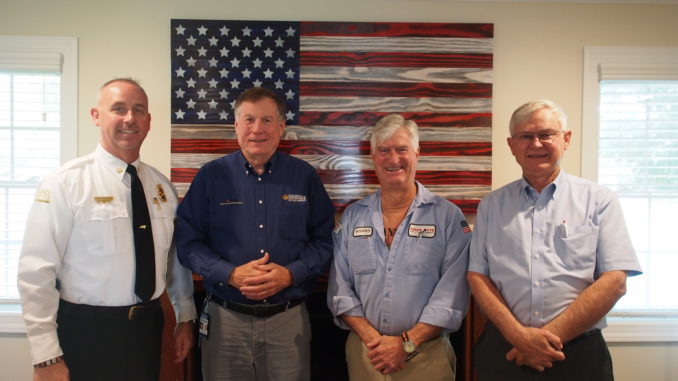
OAKBORO — Members of the North Carolina Department of Insurance, including Commissioner Mike Causey and Chief State Fire Marshal Brian Taylor, travelled to Stanly County on Monday morning to join Charlotte Pipe and Foundry CEO Roddey Dowd Jr. for a tour of the company’s upcoming cast-iron foundry in Oakboro.
The visit began with a roundtable discussion, led by Dowd, Causey and state Rep. Wayne Sasser (R-Stanly), on topics that ranged from the questionable building codes of foreign lumber suppliers to the rise of battery fires caused by solar panels.
The Department of Insurance commissioner and his chief fire marshal both voiced their approval of Charlotte Pipe’s safety standards and preliminary building methods that have been deployed on the 450-acre Charlotte Pipe construction site property located off of Silver Road.
“This is a big deal and it will put Oakboro on the map,” Causey told SCJ. “I am very impressed with the size and scope of this. Usually when you pour concrete in a textile finishing plant, you might have footings that are three feet deep but these might be 25-feet deep.”
Following the meeting, Dowd distributed safety helmets and vests to the Department of Insurance officials and provided a tour guide of the plant.
“This is one of the biggest plants in the United States — a $425 million plant with 530 high-paying jobs. This is the largest project built in North Carolina in probably 30 years,” the Charlotte Pipe chairman said.
During the tour, Dowd told SCJ about the battles his company has been facing with cases of intellectual property theft overseas. He recounted one story in particular of a sales associate discovering counterfeit Charlotte Pipe materials at a trade fair in Indonesia. These revelations have led to the business registering its trademark in countries throughout the world for protection against theft.
“We could have built this plant with all the money we spent fighting the Chinese during my career,” Dowd said. “We fight them with the codes and standards, but ultimately, it comes down to price. We’ve had to lower our price; and if you have to lower your price 30% to 40%, it hurts.”
After the tour of the construction site, Sasser spoke with SCJ about the economic boost that Charlotte Pipe could potentially provide to not just Oakboro but all of Stanly County. The state congressman mentioned that over the years, some other companies have appeared to build their roots in the county only to move to other areas once a higher bidder came along.
Sasser’s forecast is that Charlotte Pipe is here to stay.
“This is the biggest thing ever here. I was actually in high school when Alcoa came here, so I’ve seen a lot,” Sasser said. “You can go work for them [Charlotte Pipe] and average $100,000 a year with benefits — so when you retire, you’ll have $1 million in your 401K.”
As one of America’s top manufacturers of cast iron and plastic pipe and fittings, the business currently operates out of seven locations and has constantly expanded since it began in Charlotte with 25 employees back in 1901.
Due to the vast size of the Oakboro plant, the project is expected to require two more years of construction until it is finished and ready to become Charlotte Pipe’s primary location.
